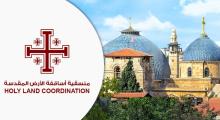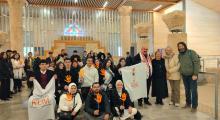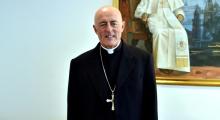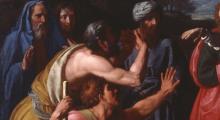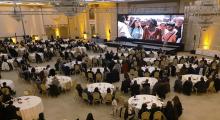Issued by the Catholic Center for Studies and Media - Jordan. Editor-in-chief Fr. Rif'at Bader - موقع أبونا abouna.org

Following is the text of the meditation by Cardinal Pierbattista Pizzaballa, Latin Patriarch of Jerusalem, for the fifth Sunday of Easter, May 12, 2024:
We have arrived at the last days of this Easter season, and the feast of Pentecost is approaching, in which the Father's plan of salvation is brought to completion, which was fulfilled in the Passover of the Lord Jesus.
The whole history of salvation is aimed at this moment, to this event: everything tends toward this day, prepared from time immemorial, and carried out with infinite patience by the Father's Providence.
Within this history, there is a term that returns often, which speaks of an experience that has a deep connection, a great attunement, with salvation.
For God’s people, salvation is always linked to a going out, and a coming forth.
Israel is enslaved in Egypt, and God intervenes with a powerful hand to bring his people out of a land of enslavement.
Israel is deported to Babylon, and God again intervenes to bring the captives out of the land to which they have been deported, to lead them back to the land of freedom. For God's people can't be a people of slaves.
The prophet Ezekiel says that "bringing out" defines God's work, and how he will be recognized, and distinguished, from all other gods: "You shall know that I am the LORD when I open your graves and make you come up out of them, my people!" (Ez 37:13). God saves because He opens, because He liberates. An idol can never do this, but God can; God opens the tombs and brings forth, brings death to life.
All of this is mentioned again in the New Testament, with even greater evidence.
With the manifestation of Jesus, the heavens are opened, and we can continue for a while to see how the presence of Jesus among men represents a great possibility of openness and, therefore, of salvation: Passover opens a way to true life.
However, today's Gospel (John 17:11b-19) tells us where this life wants to take us, and where this journey can and should go.
We come out of our solitude and bondage ultimately to be one with one another (John 17:11): this is the goal.
Just as the Father and Jesus are one, united in one love, so we too, are called to love one another and become one body. But this is only possible when one is willing to get out of himself: only the one who abandons himself, who renounces thinking of himself, who sets out on an exodus that never ends, only this one meets with his brother and becomes one with him.
And this is precisely the truth of Man, of which Jesus speaks about (John. 17:17), which He reveals to us through His Word: our truth is not only what is seen of us, what we are, but also what we are called to become, that is, people of communion, capable of welcoming others within oneself.
The one who "goes out" and sets out, the one who opens himself to God's gift, this one is consecrated in truth (John. 17:17), meaning, he belongs to Christ, he has taken on His lifestyle, the features of His face: his life is true as the Lord's is true, of that truth which is nothing but communion.
The Lord warns us: that this is not an obvious path. There is a risk of getting lost, that is, of not becoming true, of not being consecrated in the truth. The example of this being lost is Judas (John 17:12), whom Jesus does not call by his name, but defines exactly so, as the one who got lost, who has not become true, has not become one with his brothers.
The ones who do not look beyond themselves, those who do not live in the path of exodus on a daily basis, are lost. Meaning, they cannot reach the goal of the truth for which they were created and called for.
Whoever, on the other hand, remains in this truth of self, in this faithfulness to the call to love, then, one can witness in the world what a true life, a full life, is.
One does not proclaim it in words, because truth is not an idea or a concept, but a way of living life in love. It is announced by becoming one with those around us, in patience and mercy, in silence and humble prayer, which invokes the Spirit of love for all.
+Pierbattista


